外研版(2019)必修 第二册Unit 2 Let's celebrate!! Using language 课件 (共22张PPT)
文档属性
| 名称 | 外研版(2019)必修 第二册Unit 2 Let's celebrate!! Using language 课件 (共22张PPT) |
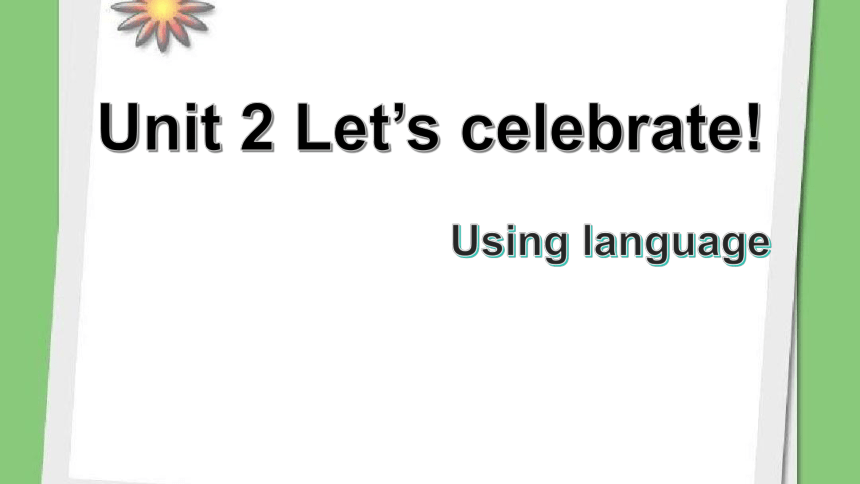
|
|
| 格式 | pptx | ||
| 文件大小 | 2.7MB | ||
| 资源类型 | 教案 | ||
| 版本资源 | 外研版(2019) | ||
| 科目 | 英语 | ||
| 更新时间 | 2024-03-03 20:47:54 | ||
图片预览

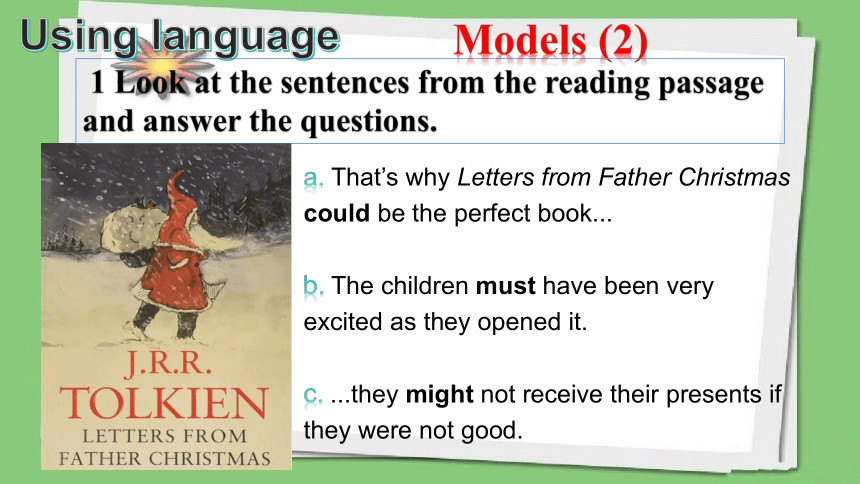
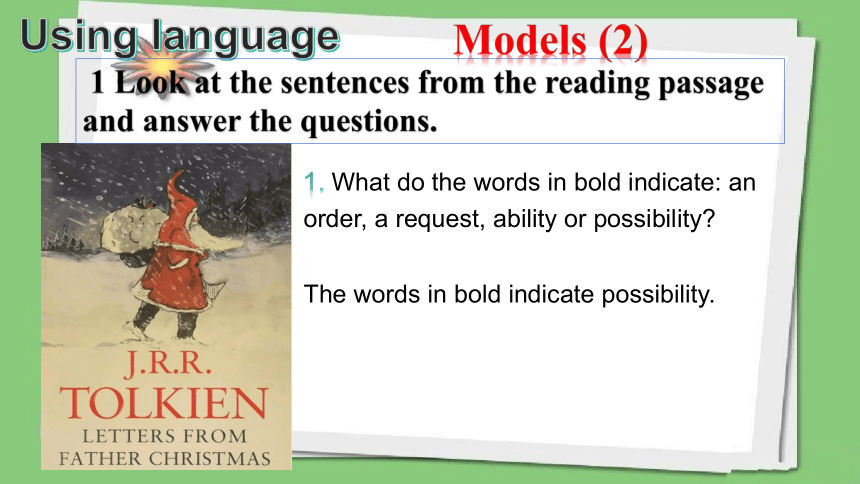
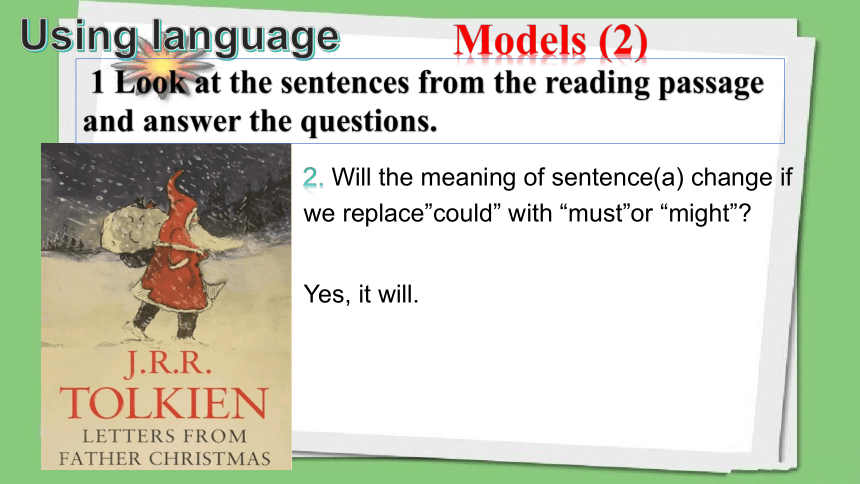
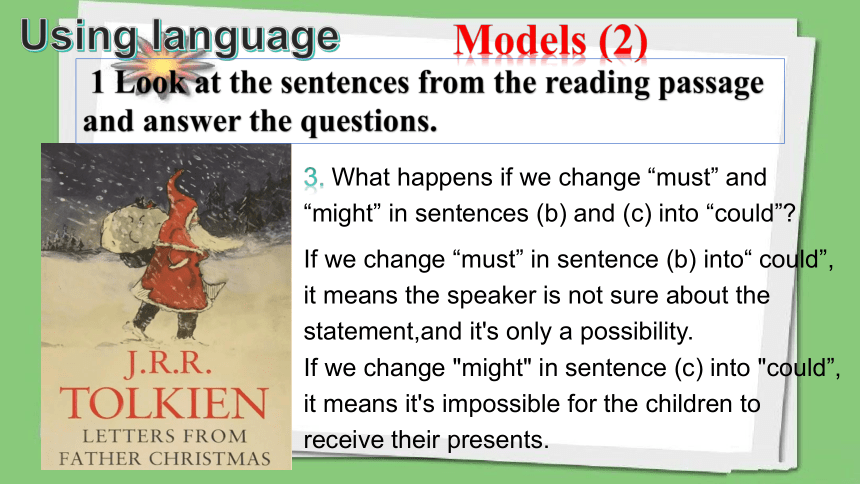
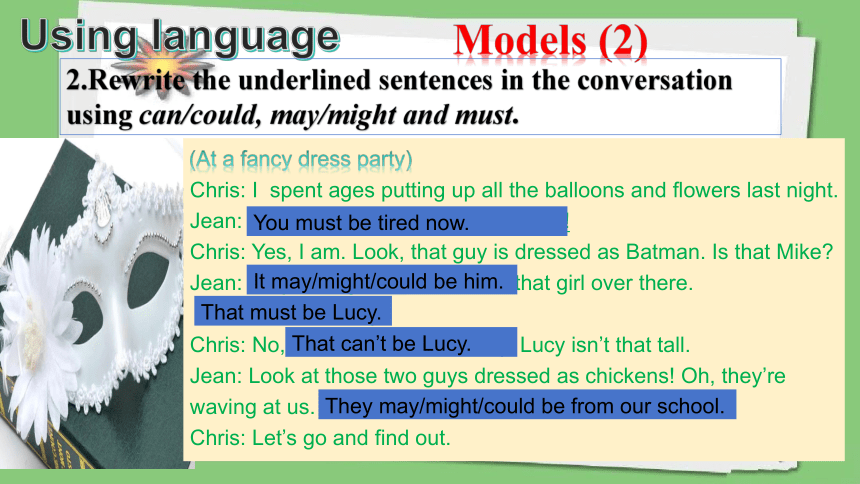
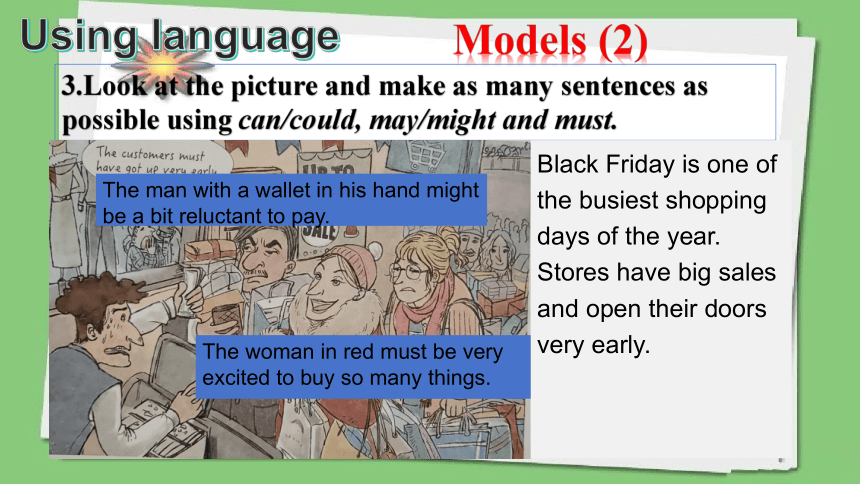
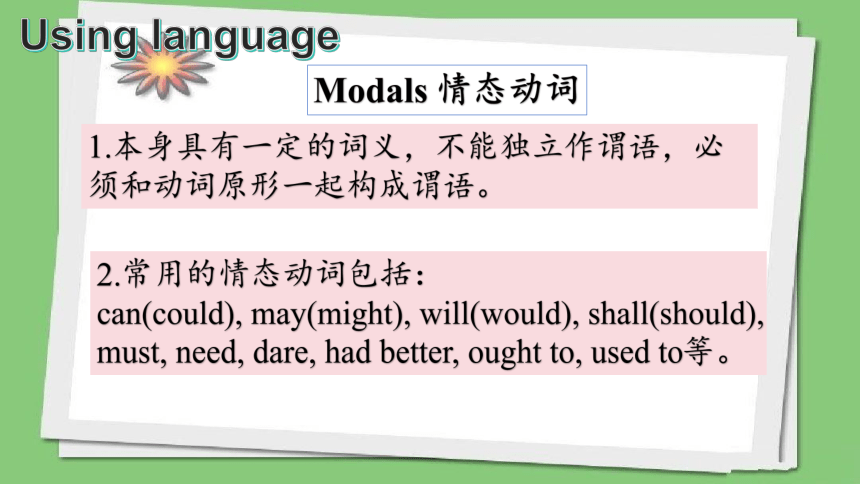
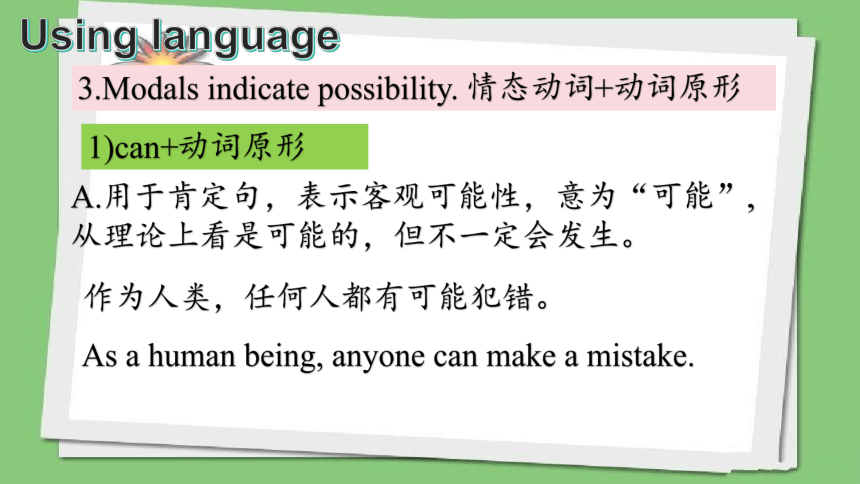
文档简介
(共22张PPT)
Unit 2 Let’s celebrate!
Using language
Using language
Models (2)
1 Look at the sentences from the reading passage and answer the questions.
a. That’s why Letters from Father Christmas could be the perfect book...
b. The children must have been very excited as they opened it.
c. ...they might not receive their presents if they were not good.
Using language
Models (2)
1 Look at the sentences from the reading passage and answer the questions.
1. What do the words in bold indicate: an order, a request, ability or possibility
The words in bold indicate possibility.
Using language
Models (2)
1 Look at the sentences from the reading passage and answer the questions.
2. Will the meaning of sentence(a) change if we replace”could” with “must”or “might”
Yes, it will.
Using language
Models (2)
1 Look at the sentences from the reading passage and answer the questions.
3. What happens if we change “must” and “might” in sentences (b) and (c) into “could”
If we change “must” in sentence (b) into“ could”, it means the speaker is not sure about the statement,and it's only a possibility.
If we change "might" in sentence (c) into "could”, it means it's impossible for the children to receive their presents.
Using language
Models (2)
2.Rewrite the underlined sentences in the conversation using can/could, may/might and must.
(At a fancy dress party)
Chris: I spent ages putting up all the balloons and flowers last night.
Jean: I expect you are feeling tired now!
Chris: Yes, I am. Look, that guy is dressed as Batman. Is that Mike
Jean: It’s possibly him. Check out that girl over there.
I’m sure that’s Lucy.
Chris: No, I don’t think that’s Lucy. Lucy isn’t that tall.
Jean: Look at those two guys dressed as chickens! Oh, they’re waving at us. Maybe they’re from our school.
Chris: Let’s go and find out.
You must be tired now.
It may/might/could be him.
That must be Lucy.
That can’t be Lucy.
They may/might/could be from our school.
Using language
Models (2)
3.Look at the picture and make as many sentences as possible using can/could, may/might and must.
Black Friday is one of the busiest shopping days of the year. Stores have big sales and open their doors very early.
The woman in red must be very excited to buy so many things.
The man with a wallet in his hand might be a bit reluctant to pay.
Using language
2.常用的情态动词包括:
can(could), may(might), will(would), shall(should), must, need, dare, had better, ought to, used to等。
Modals 情态动词
1.本身具有一定的词义,不能独立作谓语,必须和动词原形一起构成谓语。
Using language
3.Modals indicate possibility. 情态动词+动词原形
1)can+动词原形
A.用于肯定句,表示客观可能性,意为“可能”,从理论上看是可能的,但不一定会发生。
作为人类,任何人都有可能犯错。
As a human being, anyone can make a mistake.
Using language
3.Modals indicate possibility.
1)can+动词原形
B.用于否定句或疑问句,表示对现在的动作或状态进行主观的猜测,意为“可能”,或表示惊异、怀疑等态度.
他不可能有很多钱。
He can't have a lot of money.
Using language
3.Modals indicate possibility.
2)may+动词原形
表示主观的推测,意为“或许”用于肯定句和否定句均可。
他现在可能很忙。
He may be very busy now.
他可能不在家。
He may not be at home.
表示可能性时,can't 语气较强,表示“不可能”;may not语气较弱,表示“可能不,或许不”。
Using language
3.Modals indicate possibility.
3)might+动词原形
表示推测,意为“可能”,可以指过去的情况,也可以指现在的情况,但语气比may更加不肯定。用于肯定句或否定句均可。
他们现在可能有很多活儿要干,不过我不确定。
They might have a lot of work to do now but I'm not sure.
Using language
3.Modals indicate possibility.
4)could+动词原形
意为“可能”,可以指过去的情况,也可以指现在的情况,语气缓和。多用于否定句或疑问句。
他看起来很年轻,不可能超过50岁。
He looks young. He couldn't be over 50.
Using language
3.Modals indicate possibility.
5) must+动词原形
表示猜测,意为“准是,一定”通常用于肯定句。
瞧他那辆新车。他肯定很有钱。
Look at his new car. He must have a lot of money.
Using language
3.Modals indicate possibility. 情态动词+完成式
1)must+have done
表示对已发生情况的推测,通常用于肯定句。
She must have gone home.
她肯定已经回家了。
Using language
3.Modals indicate possibility.
2)can+have done
表示对已发生情况的推测,主要用于否定句或疑问句。
You can't have forgotten her.
你不可能已经忘记她了。
Using language
3.Modals indicate possibility.
3) could+have done
表示对过去情况的推测,多用于否定句或疑问句。
He could not have been more than 16 at that time.
他当时不可能超过16岁。
Using language
3.Modals indicate possibility.
4)may/might+have done
表示对已发生事情的不肯定的推测,might相比may语气更加不肯定。
He may / might have come by train.
他可能是坐火车来的。
Using language
3.Modals indicate possibility. Exercises
1.[2020·天津卷] Jim says we stay in his house as long as we leave it clean and tidy.
2.[2020·全国Ⅲ卷] The wise old man told him to travel to the Li River—perhaps he learn a little from the greatest artist in the world.
3.[2020·新高考全国Ⅰ卷] Do you want to be a good public speaker Here are some principles you master.
can/may
could
must
Using language
3.Modals indicate possibility. Exercises
4.[2020·全国Ⅰ卷] Rather than getting caught up in how you could (do) better,why not offer yourself a compassionate (有同情心) response
5.[2018·北京卷] In today's information age, the loss of
data cause serious problems for a company.
6.[2017·北京卷] Samuel,the tallest boy in our class
, easily reach the books on the top shelf.
have done
can
can
Using language
3.Modals indicate possibility. Exercises
7.[2015·重庆卷] You be Carol. You haven't changed a bit after all these years.
8.[2015·陕西卷] You feel all the training a waste of time,but I'm a hundred percent sure later you'll be grateful you did it.
must
may
谢谢观看
Unit 2 Let’s celebrate!
Using language
Using language
Models (2)
1 Look at the sentences from the reading passage and answer the questions.
a. That’s why Letters from Father Christmas could be the perfect book...
b. The children must have been very excited as they opened it.
c. ...they might not receive their presents if they were not good.
Using language
Models (2)
1 Look at the sentences from the reading passage and answer the questions.
1. What do the words in bold indicate: an order, a request, ability or possibility
The words in bold indicate possibility.
Using language
Models (2)
1 Look at the sentences from the reading passage and answer the questions.
2. Will the meaning of sentence(a) change if we replace”could” with “must”or “might”
Yes, it will.
Using language
Models (2)
1 Look at the sentences from the reading passage and answer the questions.
3. What happens if we change “must” and “might” in sentences (b) and (c) into “could”
If we change “must” in sentence (b) into“ could”, it means the speaker is not sure about the statement,and it's only a possibility.
If we change "might" in sentence (c) into "could”, it means it's impossible for the children to receive their presents.
Using language
Models (2)
2.Rewrite the underlined sentences in the conversation using can/could, may/might and must.
(At a fancy dress party)
Chris: I spent ages putting up all the balloons and flowers last night.
Jean: I expect you are feeling tired now!
Chris: Yes, I am. Look, that guy is dressed as Batman. Is that Mike
Jean: It’s possibly him. Check out that girl over there.
I’m sure that’s Lucy.
Chris: No, I don’t think that’s Lucy. Lucy isn’t that tall.
Jean: Look at those two guys dressed as chickens! Oh, they’re waving at us. Maybe they’re from our school.
Chris: Let’s go and find out.
You must be tired now.
It may/might/could be him.
That must be Lucy.
That can’t be Lucy.
They may/might/could be from our school.
Using language
Models (2)
3.Look at the picture and make as many sentences as possible using can/could, may/might and must.
Black Friday is one of the busiest shopping days of the year. Stores have big sales and open their doors very early.
The woman in red must be very excited to buy so many things.
The man with a wallet in his hand might be a bit reluctant to pay.
Using language
2.常用的情态动词包括:
can(could), may(might), will(would), shall(should), must, need, dare, had better, ought to, used to等。
Modals 情态动词
1.本身具有一定的词义,不能独立作谓语,必须和动词原形一起构成谓语。
Using language
3.Modals indicate possibility. 情态动词+动词原形
1)can+动词原形
A.用于肯定句,表示客观可能性,意为“可能”,从理论上看是可能的,但不一定会发生。
作为人类,任何人都有可能犯错。
As a human being, anyone can make a mistake.
Using language
3.Modals indicate possibility.
1)can+动词原形
B.用于否定句或疑问句,表示对现在的动作或状态进行主观的猜测,意为“可能”,或表示惊异、怀疑等态度.
他不可能有很多钱。
He can't have a lot of money.
Using language
3.Modals indicate possibility.
2)may+动词原形
表示主观的推测,意为“或许”用于肯定句和否定句均可。
他现在可能很忙。
He may be very busy now.
他可能不在家。
He may not be at home.
表示可能性时,can't 语气较强,表示“不可能”;may not语气较弱,表示“可能不,或许不”。
Using language
3.Modals indicate possibility.
3)might+动词原形
表示推测,意为“可能”,可以指过去的情况,也可以指现在的情况,但语气比may更加不肯定。用于肯定句或否定句均可。
他们现在可能有很多活儿要干,不过我不确定。
They might have a lot of work to do now but I'm not sure.
Using language
3.Modals indicate possibility.
4)could+动词原形
意为“可能”,可以指过去的情况,也可以指现在的情况,语气缓和。多用于否定句或疑问句。
他看起来很年轻,不可能超过50岁。
He looks young. He couldn't be over 50.
Using language
3.Modals indicate possibility.
5) must+动词原形
表示猜测,意为“准是,一定”通常用于肯定句。
瞧他那辆新车。他肯定很有钱。
Look at his new car. He must have a lot of money.
Using language
3.Modals indicate possibility. 情态动词+完成式
1)must+have done
表示对已发生情况的推测,通常用于肯定句。
She must have gone home.
她肯定已经回家了。
Using language
3.Modals indicate possibility.
2)can+have done
表示对已发生情况的推测,主要用于否定句或疑问句。
You can't have forgotten her.
你不可能已经忘记她了。
Using language
3.Modals indicate possibility.
3) could+have done
表示对过去情况的推测,多用于否定句或疑问句。
He could not have been more than 16 at that time.
他当时不可能超过16岁。
Using language
3.Modals indicate possibility.
4)may/might+have done
表示对已发生事情的不肯定的推测,might相比may语气更加不肯定。
He may / might have come by train.
他可能是坐火车来的。
Using language
3.Modals indicate possibility. Exercises
1.[2020·天津卷] Jim says we stay in his house as long as we leave it clean and tidy.
2.[2020·全国Ⅲ卷] The wise old man told him to travel to the Li River—perhaps he learn a little from the greatest artist in the world.
3.[2020·新高考全国Ⅰ卷] Do you want to be a good public speaker Here are some principles you master.
can/may
could
must
Using language
3.Modals indicate possibility. Exercises
4.[2020·全国Ⅰ卷] Rather than getting caught up in how you could (do) better,why not offer yourself a compassionate (有同情心) response
5.[2018·北京卷] In today's information age, the loss of
data cause serious problems for a company.
6.[2017·北京卷] Samuel,the tallest boy in our class
, easily reach the books on the top shelf.
have done
can
can
Using language
3.Modals indicate possibility. Exercises
7.[2015·重庆卷] You be Carol. You haven't changed a bit after all these years.
8.[2015·陕西卷] You feel all the training a waste of time,but I'm a hundred percent sure later you'll be grateful you did it.
must
may
谢谢观看
